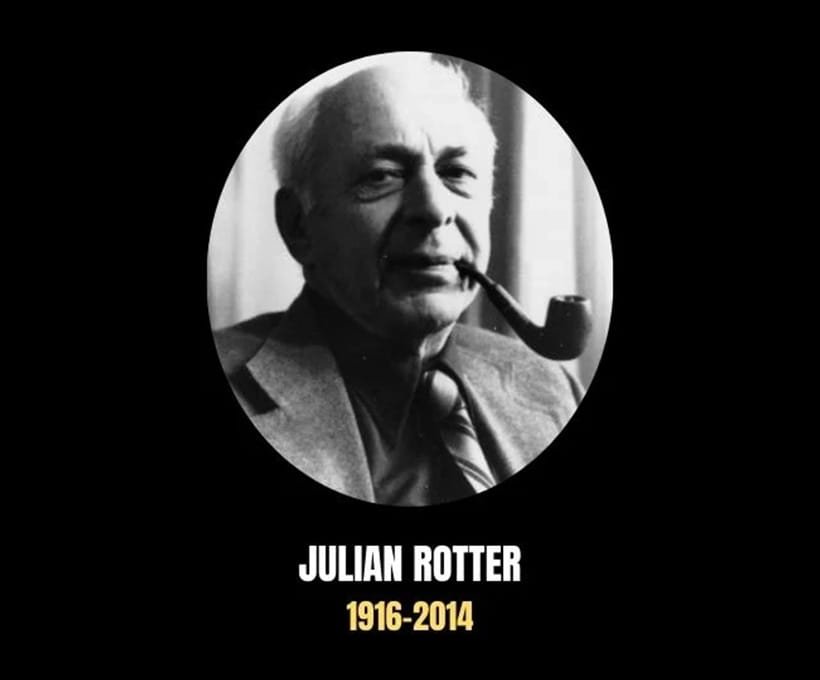Julian Rotter’s Social Learning Theory
Social Learning Theory (SLT) is a cornerstone of psychology, showing how behavior is guided by goals, expectations, and the situations we face. While Albert Bandura’s Social Learning Theory emphasized observation and modeling, psychologist Julian B. Rotter developed a pioneering version that introduced four precise constructs—Reward Value, Behavioral Potential, Expectancy, and the Psychological Situation. These constructs became the scientific foundation for research on Internal Locus of Control and continue to influence modern approaches to personal growth.
Julian Rotter’s Social Learning Theory profoundly influenced Dr. Mulry, who studied under Rotter and maintained a close professional and personal relationship with him throughout his career. The theory is unique for its clearly defined constructs and precise specifications of how these constructs interact. Notably, SLT was the first of the Cognitive-Behavioral Theories, a category that now dominates psychological practices worldwide.
Below is a clear introduction to the foundational constructs of Julian Rotter’s Social Learning Theory and how they apply to everyday life.
The First Basic Assumption: People Are Goal-Directed
A central assumption of Social Learning Theory is that people are goal-directed. Generally, we are motivated to seek pleasure and avoid pain. To develop a meaningful personal strategy for achieving these goals, SLT identifies four fundamental constructs:
Reward Value (RV)
In SLT, Reward Value (RV) is the degree of preference you have for one reward over another. For example, most people prefer $100 to $1—a straightforward indication of RV. Understanding your RV preferences allows for predicting your behavior. For instance, if you prefer playing the piano over the guitar, it’s likely you’ll focus your efforts on piano practice.
Since everyone has multiple RVs, ranking them helps clarify the choices you make as you pursue various goals. Recognizing your personal RV rankings helps you make intentional, meaningful choices.
The Personal Concerns Inventory (PCI) is a valuable tool for self-assessing your personal RV preferences and clarifying your goals.
Behavioral Potential (BP)
Behavioral Potential (BP) refers to the likelihood of engaging in specific behaviors to achieve your preferred goals. If playing the piano is high on your list of goals, BP would involve practicing piano skills to achieve successful performance.
Expectancy (E)
Once you have defined your goals and the behaviors needed to achieve them, Expectancy (E) becomes critical. Expectancy reflects whether you believe your goal-directed actions will lead to success.
For example, if you practice piano-playing skills, do you expect your efforts to result in mastery? Expectancy is much like attitude: “I can accomplish important tasks if I put my mind to it” versus “No matter what I do, it won’t work out.” Positive expectancies lead to Focused Action, while negative expectancies lead to avoidance or minimal effort.
Expectancy influences whether you pursue a goal with energy—or avoid it altogether.
The Psychological Situation (PS)
The Psychological Situation (PS) refers to how you perceive various contexts and how they influence your success. For example, if your goal is to reduce alcohol consumption (RV) and you have a high expectancy (E) that you can succeed, the PS—such as frequenting a bar after work—may pose challenges. Recognizing how specific situations support or hinder your goals is vital for success.
The SLT Formula
Dr. Rotter summarized SLT with the following formula:
BP = f (E & RV) in PS
In simple terms, Behavioral Potential is a function of Expectancy and Reward Value in a specific Psychological Situation.
Internal And External Locus of Control
A key measure of any scientific theory’s value is its ability to generate meaningful research. Locus of Control (LOC) is one such construct from SLT that has sparked worldwide investigation.
- Internals believe personal success and rewards result from skills they have acquired.
- Externals attribute rewards to luck or the actions of powerful others.
Research consistently shows that Internals achieve greater success in life—whether in education, income, or reduced incarceration rates. For an in-depth review of LOC research, see Herbert M. Lefcourt’s book, Research with the Locus of Control Construct.
Applying Social Learning Theory
Julian Rotter’s Social Learning Theory is a pioneering framework in Clinical Psychology that emphasizes Internal Locus of Control and the goal-directed nature of human behavior. By integrating four key constructs—Reward Value (RV), Behavioral Potential (BP), Expectancy (E), and the Psychological Situation (PS)—SLT provides a formula for understanding and predicting behavior.
One of Rotter’s most significant contributions through SLT is the concept of Internal Locus of Control, which distinguishes Internals, who attribute success to their skills, from Externals, who rely on luck or powerful others. This construct has inspired extensive global research and continues to influence modern approaches to personal development.
👉 For a deeper look at how internal control works—and how you can build it—see The Science Behind Internal Locus of Control.
SLT also forms the rational foundation for the Mulry Method and for Positive Performance Psychology—a comprehensive approach that expands on Rotter’s work by integrating emotional, physiological, and performance-based strategies for personal growth. This broader approach includes:
- Relaxation Therapy (a mind-body tool for self-regulation)
- Polyvagal Theory (our visceral, emotional side)
- Backcare Programs (movement-based strategies for posture, injury prevention, and self-care)
- In The Zone Skills Training (our performance side)
If you’d like to go further, explore Positive Performance Psychology: Reconfiguring Consciousness—Dr. Reaume Carroll Mulry’s definitive guide to mastering Internal Locus of Control, applying SLT and Polyvagal Theory, and building long-term resilience on your own terms. Whether you’re starting fresh or deepening your journey, this e-book is your roadmap.
For Bandura’s Social Learning Theory, focused on observational learning, modeling, and the role of reinforcement, see our overview. It explains how people learn by watching others and why role models are so influential.

